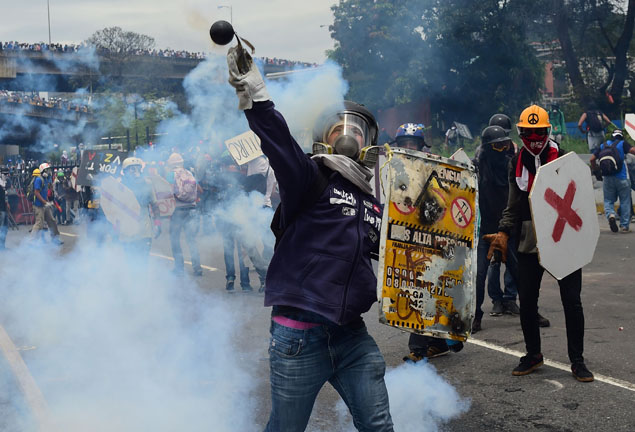CARACAS — Deadly anti-government protests threatened to rage on in Venezuela Thursday with students vowing fresh marches after a day of flames and tear gas brought the death toll to 32.
Police fired tear gas and protesters hurled Molotov cocktails on Wednesday in the latest rallies against President Nicolas Maduro's plan to rewrite the constitution.
With tension at a boiling point, rumours broke out online that jailed opposition figure Leopoldo Lopez had died in prison. The government released a video of Lopez denying the claims.
The opposition accused Maduro of trying to strengthen his grip on power and delay elections by launching constitutional reforms.
Daniel Ascanio, a student leader from Simon Bolivar University, told reporters that students will march from campuses on Thursday around the country to demand "democracy and freedom".
"We will be joined by unions, homemakers, and lawmakers. All sectors of society will mobilise to send a message to Maduro."
The opposition blames the president for food and medicine shortages afflicting the oil-rich country. They want a vote on removing him from office.
The president, elected in 2013, says the crisis is a US-backed capitalist conspiracy and vows to continue his side's socialist "revolution".
The opposition has accused authorities of violently repressing protests. The government says the opposition is fomenting violence.
"I don't know how long the protests are going to last," senior opposition leader Henrique Capriles told AFP in an interview.
"If we were being violent, if we were not being democratic, we would already have toppled the government."
In his latest crisis maneuver, Maduro on Wednesday launched procedures at the electoral council to elect a "constituent assembly".
It will draw up a new constitution "so that our people ... with their voice can decide the destiny of our homeland", he said.
Private polls indicate that more than 70 per cent of those interviewed do not support Maduro.
Maduro said the constitutional reform body would not include political parties with seats in the opposition-controlled national assembly, but representatives of social groups traditionally loyal to him.
The opposition said that skews the assembly in Maduro's favour.
Maduro's centre-right opponents and some international powers said the move is an attempt to dodge local elections this year and a presidential poll set for late 2018.
"Since the government cannot win elections, it wants to dismantle the system for holding them," Capriles told AFP.
Attorney general Luisa Ortega caused a surprise in March by breaking ranks with the government over the political crisis.
She condemned the High Court's short-lived suspension of the National assembly — the only pillar of state authority not in the hands of Maduro supporters.
Ortega told The Wall Street Journal that the government should ensure people's right to demonstrate freely, without arbitrary arrests.
"We can't demand peaceful and legal behavior from citizens if the state takes decisions that don't accord with the law," the Journal quoted her as saying on Wednesday.
Venezuela has seen three attempted military coups since 1992. In 2014, clashes at anti-government protests killed 43 people.
Despite the country's chaos, Maduro retains the military's public backing — one thing that analysts say could yet tip the balance against him.
"What happens if the National Guard [military police] says they are not going to continue the repression?" Capriles said.
"Will Maduro's position be sustainable?"
The crisis has been fuelled by falling prices for Venezuela's crucial oil exports, but the government has so far avoided defaulting on its foreign debts.
